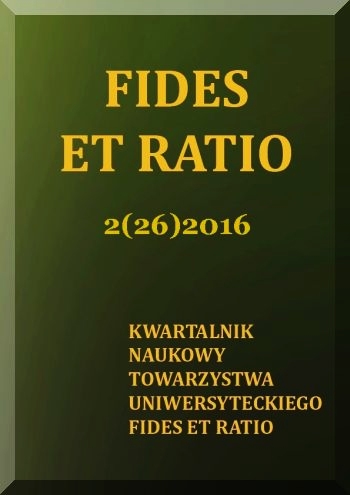Abstract
Forgiveness is an important aspect of human life. The forgiveness we can speak from the perspective of the person forgiving and from the perspective wrongdoer. There are also a lot of conditions for forgiveness. His understanding depends on age, stage of development and the level of personal maturity. The problem of understanding forgiveness covers many spheres: the meaning, purpose, people, circumstances, contexts, process, emotions, pains, consequences, the role. The above aspects of forgiveness became the basis for carrying out the narrative research to understand of forgiveness in women in middle adulthood. Examined was 52 -year-old woman using a narrative interview, consisting of two phases: (1) phase of the stimulus narrative and (2) the phase of detailed questions.
The test result obtained was a kind of empirical material. His analysis concerned the understanding of forgiveness on the basis of the above-mentioned sphere. There has also been the description and interpretation of the understanding of forgiveness based on the language of the person examined: an analysis of semantic and psychological and structural analysis. The analyzes were obtained peculiar world of meaning for understanding forgiveness from a person in middle adulthood.
References
Erikson, H., E. (2002). Dopełniony cykl życia . Poznań: Dom Wydawniczy REMBIS.
Erikson, H., E. (2004). Tożsamość a cykl życia. Poznań: Wydawnictwo Zysk i S-ka.
Everett, L., Worthington, JR. (1992). Promoting mutual forgiveness within the fractured relationship. Psychoterapy 27(2), s. 219-223.
Levinson, D., J. (1986) A conception of adult development. American Psychologist, 4, s. 3–13.
Levinson, D., J. (1977). The mid-life transition: A period in adult psychosocial development. Journal for the Study of Interpersonal Processes, 40, s. 99–112.
Mellibruda, J. (1992). Nieprzebaczona krzywda. Warszawa: Polskie Towarzystwo Psychologiczne.
Mellibruda, J. (1995). Pułapka niewybaczonej krzywdy. Warszawa: Polskie Towarzystwo Psychologiczne.
Monbourquette, J. (1992). Jak przebaczać? Droga poprzez dwanaście etapów. Wydawnictwo: Kraków M.
Tokarska, U. (1999). W poszukiwaniu jedności i celu. Wybrane techniki narracyjne [w:] A. Gałdowa (red.). Wybrane zagadnienia z psychologii osobowości. Kraków: Wydawnictwo Uniwersytetu Jagiellońskiego.
